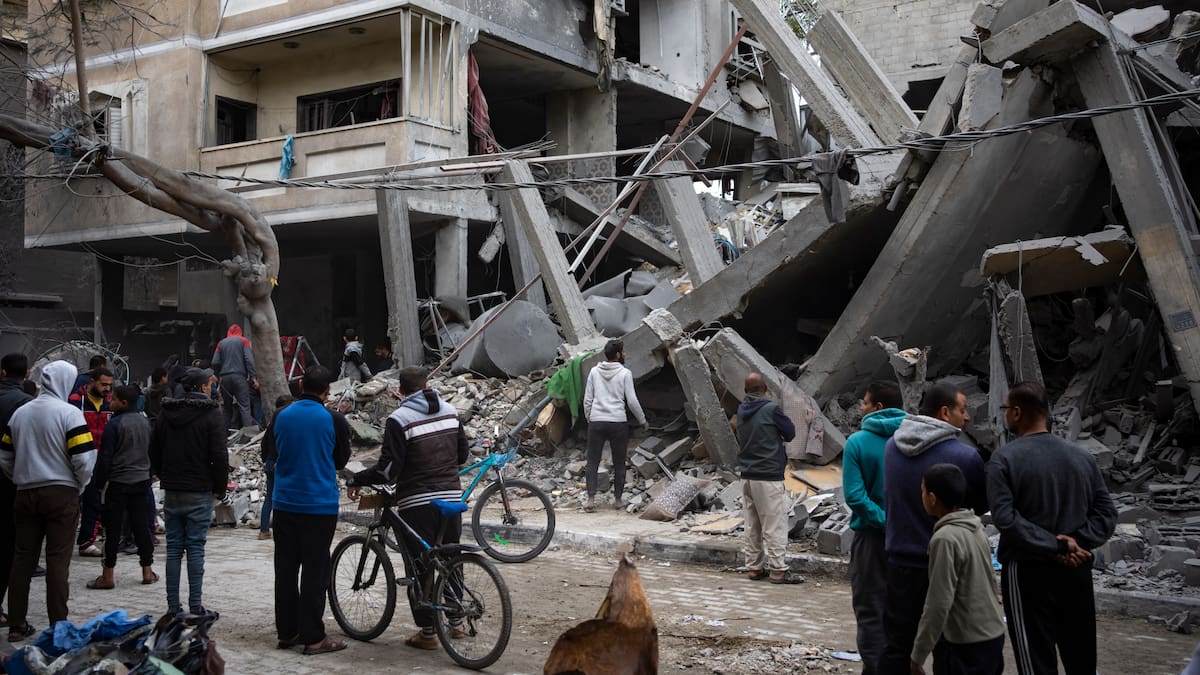Palestinians inspect the damage of residential buildings after an Israeli airstrike in Rafah. Photo / AP
OPINION
Earlier this year, after a prolonged break, I emerged from holiday mode and began to catch up on the news again.
This was a bad move.
Almost immediately, I was bombarded with stories laying bare the bleakness of the world – Israel-Palestine, Ukraine-Russia, US electioneering, climate struggles, and our own internal politics in the lead-up to Waitangi – which had coalesced to create an engulfing sea of conflict.
I can’t say that it feels like things have gotten much better in the weeks since.
As we approach Easter, I’ve been reflecting on the presence of immense conflict in the world and the collective sense of overwhelment many of us share.
I can see that as humanity we tend to fall back on one of three default coping mechanisms when faced with an engulfing tide of polarising, complex or disturbing events.

The first is to double-down on one issue, becoming the righteous warriors for one side, and forgetting the consequences for others. In doing so, we become part of the problem.
As a friend once said to me: “In order to make an omelette, you need to break eggs – but people aren’t eggs, and you shouldn’t break them.”
As we dig deep into what we believe is right, we reconcile the actions of those on ‘our side’ of the issue as justified, even when those actions cause harm to others.
If we’re not careful, what we’re really doing is damaging humanity in the process. The way we propagate peace or justice must not create a tit-for-tat cycle. We must never cross the line by hurting people, even in the pursuit of doing good.
The second response to overwhelm is where we put our heads in the sand and act like conflict doesn’t exist – filling our days with distractions and the numbness of entertainment.
One of my colleagues refers to this as ‘bread and circuses’, quoting the Roman satirist Juvenal (I wouldn’t know – I’m too busy watching Netflix).
The third response sees us become so overwhelmed that we give up, entering a nihilistic depression and seeing no point in anything. That’s a dangerous place to be, in which all moral bets are off.
The trouble with all of these approaches is that we lose sight of the fact that everyone has inherent value (or, if you’re of a Christian bent, that everyone is made in God’s image).
We are all each other’s brother, sister, mother, father, whānau – and to look into the face of another human being is to see the face of God. The same goes for looking in the mirror.
Whether our default response is one of righteous stubbornness, denial or nihilism, we damage each other and ourselves.
This coming Maundy Thursday (the Thursday before Easter), I’m joining a Pilgrimage for Peace happening across the world, where those who seek peace for Israel-Gaza will walk 41km – the length of the Gaza Strip.

During this time, we will pray for those innocents on both sides, because a life is a life, and all are precious.
It’s particularly poignant for me to do this in the lead-up to Easter.
Jesus chose to go about transformation in a way that always saw the image of God in the other, even as he in turn was betrayed, tortured and killed. Even on the cross, he asked for the forgiveness of those who have hurt him.
For me, there is nothing more powerful than the death and resurrection of Jesus – the creator of the world giving of himself in a self-emptying ethic of love, enthroned to death and ultimately overcoming death itself.
We in turn are invited into that same posture of emptying ourselves for others, just as Jesus did. The cross invites us into a real relationship, in which we can partner with God to bring a better reality.
Whether or not you choose to view life through the lens of Jesus, Easter is an invitation to re-examine our responses to our reality.
Let’s be guided into action for peace which is not borne out of division, denial, or depression, but is wholly centred on an ethic of love which seeks the good of others first.
Justin Duckworth is the Anglican Bishop of Wellington.




 University’s designated areas for Māori and Pasifika students ‘comparable to Ku Klux Klan’, says Winston Peters
University’s designated areas for Māori and Pasifika students ‘comparable to Ku Klux Klan’, says Winston Peters